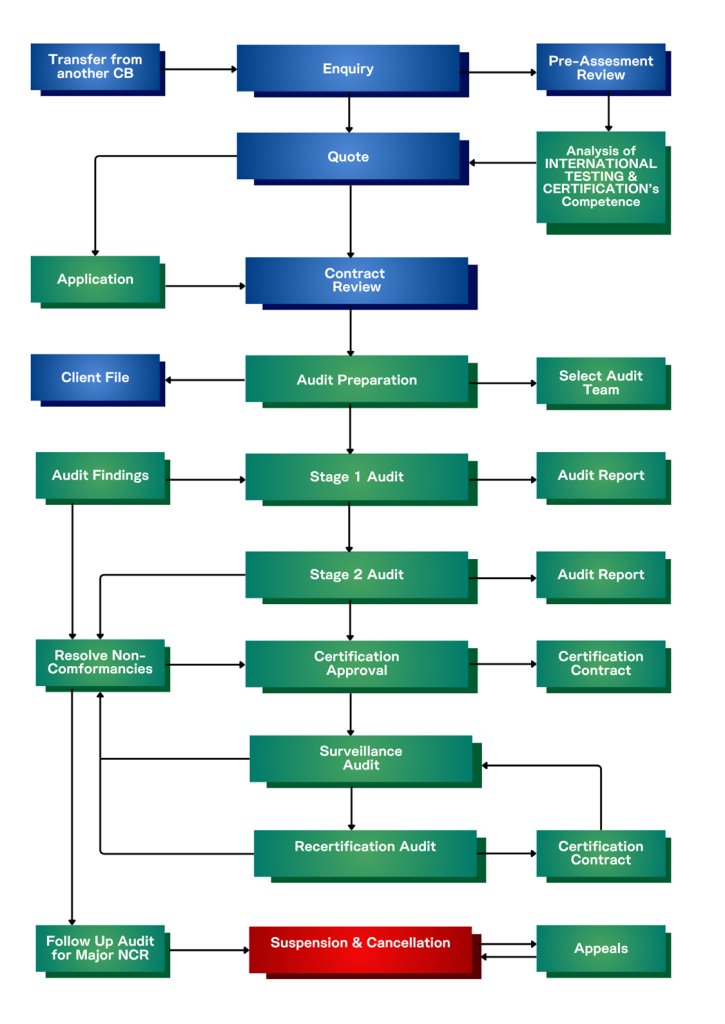SERVICES

QUALITY MANAGEMENT SYSTEM (QMS)
ISO 9001 demands that a quality management system define who is responsible for which quality-relevant activities and which procedures must be followed. To establish effective quality management in your company, we take into account your specific requirements and perspectives.

ENVIRONMENTAL MANAGEMENT SYSTEM (QMS)
Environmental Management System 14001 enables companies to establish an effective environmental management system, reduce environmental impacts, and ensure compliance with environmental regulations.
With this certification, organizations not only contribute to a greener environment, but also strengthen their positive image in the eyes of consumers and other stakeholders, open up new market opportunities, and improve operational efficiency.

OCCUPATIONAL HEALTH AND SAFETY MANAGEMENT SYSTEM (OHSMS)
Implementing an effective OHS management system will help companies in handling legal, ethical and industrial relations issues related to worker safety and the employer’s obligation to provide protection and implementing an OHS Management System will reduce accidents in the work environment and minimize related costs.

INFORMATION SECURITY MANAGEMENT SYSTEM (ISMS)
ISO/IEC 27001 certification demonstrates an organization’s commitment to protecting its information assets and helps businesses secure their clients’ data. It’s an international standard that specifies the requirements for establishing, implementing, maintaining, and continually improving an Information Security Management System (ISMS)

ANTI-BRIBERY MANAGEMENT SYSTEMS (ABMS)
ISO 37001 certification demonstrates an organization’s commitment to ethical business practices and anti-bribery measures. It provides a framework for establishing, implementing, maintaining, and improving an anti-bribery management system (ABMS), helping organizations prevent, detect, and respond to bribery, and comply with relevant laws and regulations

FOOD SAFETY MANAGEMENT SYSTEM (FSMS)
ISO 22000 certification helps organizations improve their food safety management systems by providing a framework for identifying and controlling food safety hazards.
Enables organizations to implement food safety control measures throughout the food chain, from primary production to final consumption.
Provides a framework for developing and implementing effective communication systems between all parties involved in the food chain, from suppliers to customers.
CERTIFICATION PROCESSES
The certification body always guarantees a professional and efficient implementation of your company audit including the duration of the examination according to prescribed regulations. We are happy to explain the corresponding necessities and requirements of the system recommended by us at a first contact in detail.
Below you will find a first flow chart with an example of a certification of management systems.
During the first contact with one of our worldwide certification companies, you will receive a detailed explanation and evaluation of the requirements within the certification process. We use a suitably prepared application form for your certification request and ask you to complete it as part of your certification as a company. Subsequently, your details will be checked by our employees and a proposal for your individual certification process and the corresponding measures and implementation steps will be sent. Besides the cost of this proposal, there are no additional costs for you.
In the case of acceptance of the proposal, which you have received from the certification company, the certification process can be started subsequently.

Contact Detail
-
Latinos Business District Jalan Raya Rawa Buntu, Serpong,
Kota Tangerang Selatan, Banten 15310
- info@itc-indo.com
- (+62) 816-1318498
© 2025 || ITC Indonesia
